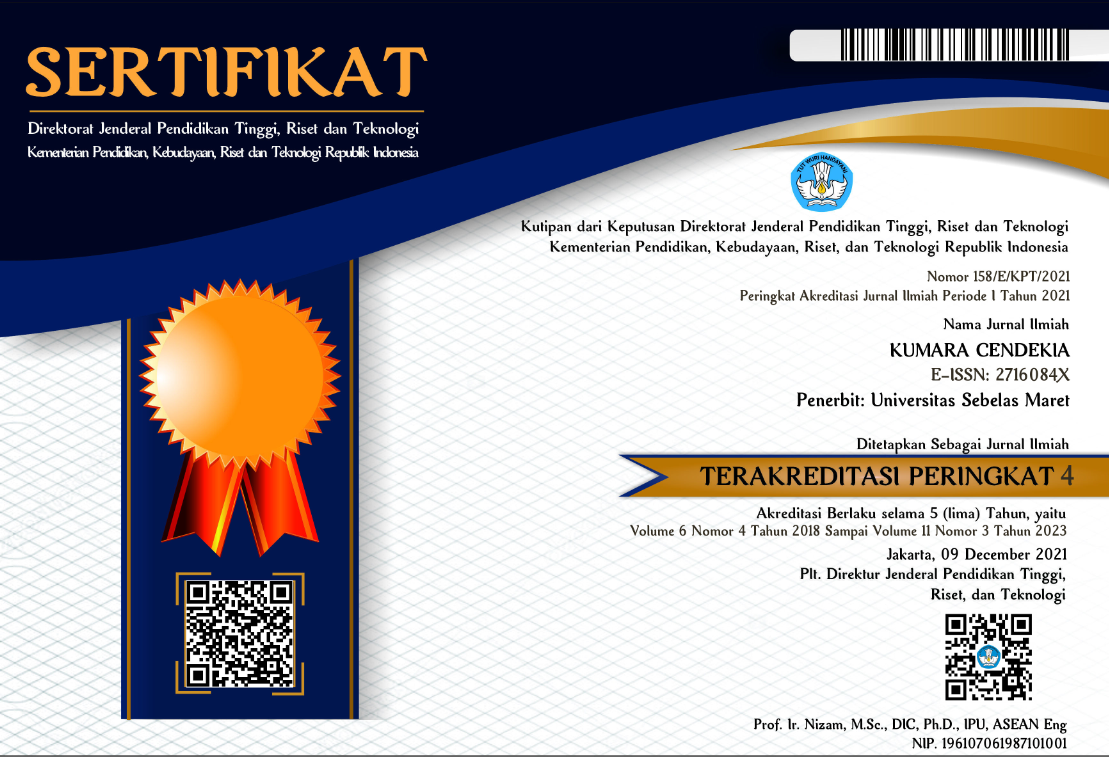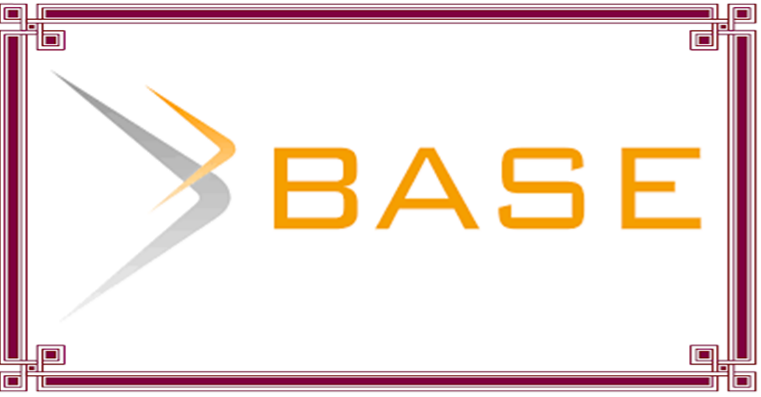HUBUNGAN KOMPETENSI EMOSI DENGAN INTERAKSI TEMAN SEBAYA ANAK USIA 5-6 TAHUN
Abstract
ABSTRAK
Penelitian ini memiliki tujuan untuk mengetahui hubungan kompetensi emosi dengan interaksi teman sebaya anak usia 5-6 tahun. Pendekatan dalam penelitian ini menggunakan pendekatan kuantitatif dengan jenis penelitian korelasi. Penelitian ini dilaksanakan pada bulan Mei 2019 dengan menggunakan sampel sebanyak 82 anak dan orangtua anak usia 4-5 tahun di Gugus Cempaka Mojosongo. Pengambilan data dari penelitian ini menggunakan kuisioner yang dibagikan kepada guru dan orang tua. Hasil uji hipotesis korelasi Spearman’s rho menunjukkan bahwa nilai signifikansi sebesar 0,000 < 0,05 yang artinya hipotesis diterima, yaitu adanya hubungan kompetensi emosi dengan interaksi teman sebaya anak usia 5-6 tahun. Hasil nilai koefisien korelasi sebesar 0,783 menggunakan uji hipotesis Spearman’s rho, yang artinya semakin tinggi kompetensi emosi anak maka semakin tinggi interaksi teman sebaya anak. Kesimpulan dari hasil penelitian ini mengutarakan bahwa terdapat hubungan diantara kompetensi emosi dengan interaksi teman sebaya anak berusia 5-6 tahun.
Kata kunci : Kompetensi Emosi. Interaksi teman sebaya, anak 5-6 tahun
ABSTRACT
This study aimed to determine the relationship of emotional competence with peer interactions of children aged 5-6 years. The approach in this study used quantitative approaches to the type of correlation research. This research was conducted in May 2019 using a sample of 82 children and parents of children aged 5-6 years in the Cempaka Mojosongo Group. Retrieval of data from this study used questionnaires distributed to teachers and parents. Hypothesis test results of Spearman’s rho correlation indicate that the significance value is 0,000 <0,05, which means the hypothesis is accepted, namely the relationship of emotional competence with peer interactions of children aged 5-6 years. The results of the correlation coefficient of 0.783 use the Spearman’s rho hypothesis test, which means that the higher the child's emotional competence, the higher the child's peer interaction. The conclusions from the results of the study indicate that there is a relationship between emotional competence and peer interaction of children aged 5-6 years.
Keywords: emotional competence ,peer interaction , children aged 5-6 years
Full Text:
PDFReferences
Beaty, J. J. (2013). Observasi perkembangan anak usia dini. Jakarta: Kencana.
Barblet, L. (2010). Complexities of assessing social and emotional competence and wellbeing in young children. . Australasian Journal of Early Childhood, 35, 13-18.
Coplan, R. J., & Rubin, K. H. (1998). Exploring and assessing nonsocial play in the preschool: the development and validation of the preschool play behavior scale. Social Development, 17, 57-89.
Denham, S. A., Blair, K. A., Demulder, E., Levitas, J., Sawyer, K., Auerbach-major, S., & Queenan, P. (2003). Preschool emotional competence: pathway to social competence?. Child Development, 74(1), 238–256.
Denham, S. (2006). Social-emotional competence as support for school readiness: What is it and how do we assess it? early education and development . Early Education and Development, 17, 57-89.
Hurlock, E. B. (2013). Perkembangan anak jilid 1. Jakarta: Erlangga.
Magdalena, S. M. (2015). Study on the temperament as a predictor of peer interactions at preschool ages. Procedia - Social and Behavioral Sciences, 187, 663-667.
Mashar, R. (2011). Emosi anak usia dini dan strategi pengembangannya. Jakarta: Kencana.
Papalia, D. E., Olds, S. W., & Feldman, R. D. (2013). Human developmented edisi ke-10. Jakarta: Salemba Humanika.
Santrock, J. W. (2007). Perkembangan anak jilid 2. Jakarta: Erlangga.
Stefan, C. A., Balaj, A., Porumb, M., Albu, M., & Miclea, M. (2009). Preschool screening for social and emotional competencies . Cognition, Brain, Behavior. An Interdisciplinary Journal, 13(2), 121-146.
Thorlacius, Ö., & Gudmundsson, E. (2017). The development of the children’s emotional adjustment scale–preschool version. Journal of Psychoeducational Assessment, 1 –17.
Refbacks
- There are currently no refbacks.












